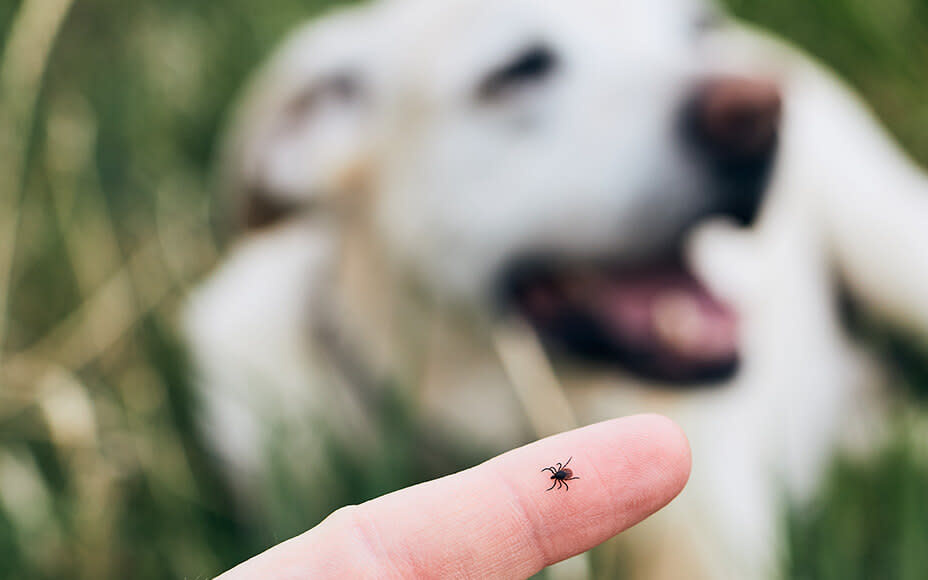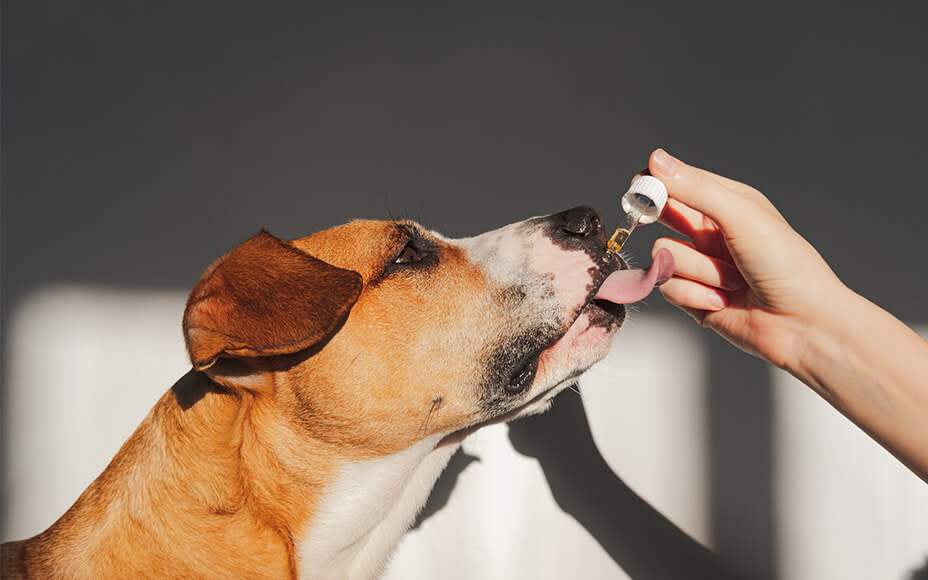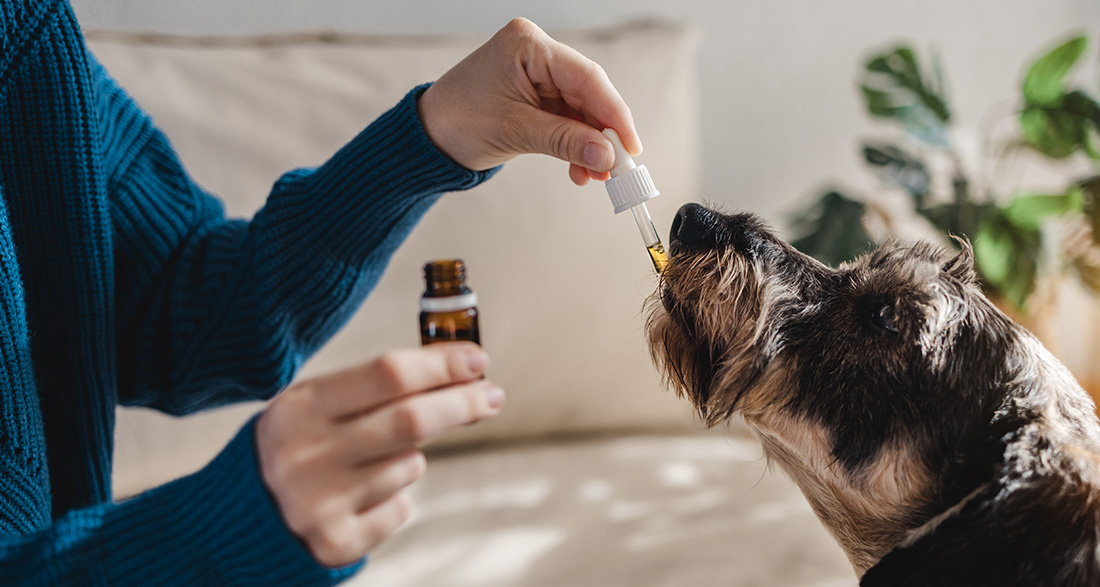Surely, you’ve heard about the beneficial properties of certain oils and fats. Learn about the oils that are particularly good for our dogs and how to dose and feed them properly.
Salmon Oil or Fish Oil for Dogs
Salmon oil, commonly referred to as fish oil, is arguably the most well-known oil in canine nutrition. It provides your dog with ample Omega-3 and Omega-6 fatty acids, supporting skin and coat health. The high-quality fatty acids in salmon oil are also a crucial element in your furry friend’s healthy heart function and joint movement, making it an ideal supplement for the diet of older dogs.
Of course, you can also ensure Omega-3 and Omega-6 fatty acids through feeding certain foods. Sardines, for example, are a healthy and nutritious snack for your four-legged friend.

Algae Oil – the Vegan “Fish Oil” for Dogs
If you opt for plant-based foods and feed your dog vegan or vegetarian, algae oil is a good alternative to conventional salmon oil. It also contains essential Omega-3 and Omega-6 fatty acids and, as the name suggests, is derived from algae. Especially for dogs with allergies or intolerances, algae oil is an ideal addition to the diet and can be added daily.
Flaxseed Oil for Dogs
Flaxseeds have long been considered a superfood due to their richness in Omega-3 fatty acids, protein, and vitamins that support brain function and blood vessels. The flaxseed oil extracted from them is similarly rich in polyunsaturated plant-based Omega-3 fatty acids and Alpha-Linolenic Acid (at least 50%).
You can easily add flaxseed oil as a small sip to your dog’s dry and wet food. Do you prefer fresh ingredients in the bowl? When BARFing, the healthy and revitalizing effect of flaxseed oil, combined with our mineral mix, turns our fresh menus into a complete and super-fresh meal for your four-legged friend. Give it a try!
Hemp Seed Oil for Dogs
Hemp seed oil is characterized by a very good ratio of Omega-3 and Omega-6 fatty acids and supports a healthy nervous and immune system function. It is rich in antioxidants, linoleic acid, Alpha-Linolenic Acid, Vitamin E, Beta-Carotene, Vitamin B1 and B2, as well as many minerals. Thus, it naturally supports important metabolic functions of the body. Hemp oil is extracted from the seeds of the hemp plant and contains no THC. Therefore, daily administration of high-quality hemp oil for dogs is completely safe.
Black Seed Oil for Dogs
Black seed oil is known as a natural tick repellent for dogs. The particularly high content of essential oils in black seed oil is believed to create a scent film on the fur that acts as a deterrent to these small parasites. These oils can also support anti-inflammatory responses in the body.
You can mix a small sip of black seed oil into your dog’s food daily. However, note that it should only be used as a supplement to complete feed and not as the sole oil for BARFing. Additionally, dogs with liver problems should not receive black seed oil, as the essential oils are metabolized in the liver.

Coconut Oil for Dogs
Coconut oil is also said to have a protective effect against ticks. The reason for this is the presence of lauric acid in coconut oil, with the content should be at least 60%. For tick protection, it is recommended to apply the oil directly on the dog’s body, such as legs, head, neck, etc., just before going for a walk. Whether it’s a myth or it actually works is up to individual belief. The protective effect of coconut oil against ticks in dogs is not scientifically proven. Moreover, occasional mixing of coconut oil into the food is said to have a positive effect on coat health. However, when feeding, make sure it is exclusively pure, virgin coconut oil.
Evening Primrose Oil for Dogs
Evening primrose oil also has a very high content of linolenic acid (over 70%). It is also rich in Omega-6 fatty acids, Alpha-Linolenic Acid, and Vitamin E. Evening primrose oil is often used in dogs with skin problems and can be mixed into their food. It is said to help with itching and irritations, alleviate allergies, and provide support in case of parasite infestation.

Why Are Oils Important for My Dog?
To explain why healthy oils are important for dogs, we need to delve a bit deeper into the realm of fats. All fats, whether considered “good” or “bad,” are composed of various fatty acids. They are differentiated based on their molecule size (short-chain, medium-chain, and long-chain fatty acids) and their specific chemical bonds (saturated and unsaturated fatty acids).
- Saturated fatty acids are often referred to as “bad fats.” These include all animal fats, palm kernel fat, and coconut fat. Excessive consumption can lead to an increase in cholesterol levels, diabetes, vascular calcification, and cardiovascular diseases.
- Unsaturated fatty acids are further classified into monounsaturated, polyunsaturated, and polyunsaturated fatty acids. Polyunsaturated fatty acids are often labeled as “healthier.”
- Monounsaturated fatty acids are found, for example, in olive oil, rapeseed oil, as well as in many nuts and seeds. They are non-essential, meaning that our dogs’ bodies can produce them themselves.
- Polyunsaturated fatty acids, such as those found in salmon, algae, seeds, and nuts, include the aforementioned Omega-3 and Omega-6 fatty acids, as well as Alpha-Linolenic Acid and Linoleic Acid. These cannot be produced by our dogs’ bodies, making them essential. That is, they must be supplied to the body in sufficient quantities through diet.
High-quality oils can also support skin and coat problems. However, it’s essential to take a look at the entire diet. Often, allergies or intolerances are the cause of recurring problems. If you’re unsure about which food is suitable for your dog, take a look at our products, especially those designed for allergies and intolerances.
What Happens in Case of Deficiency?
Now, regarding the importance of healthy oils for dogs: A deficiency in essential fatty acids can lead to various symptoms and consequently health restrictions. These may include changes in the skin and coat, increased susceptibility to infections, growth disorders, excessive hair loss, or a deficiency of platelets.
Are you looking for a high-quality oil as a healthy and tasty upgrade to your furry friend’s diet? We have them all: from rich salmon oil to the plant-based power of algae oil and the digestible hemp seed oil. Take a sniff at our high-quality oils for dogs!
How to Identify a Good Oil for Dogs?
Driving to the supermarket, buying oil, and adding it to the food? Unfortunately, it’s not that simple because not all oils you find in retail are of high quality and, therefore, a healthy supplement for your furry friend. The key to a high-quality oil lies in the ratio of fatty acids.
The rule is: the higher the proportion of Omega-3 fatty acids and the lower the proportion of Omega-6 fatty acids, the better the oil. The ideal ratio of Omega-6 to Omega-3 fatty acids should ideally be between 5:1 and a maximum of 10:1.


